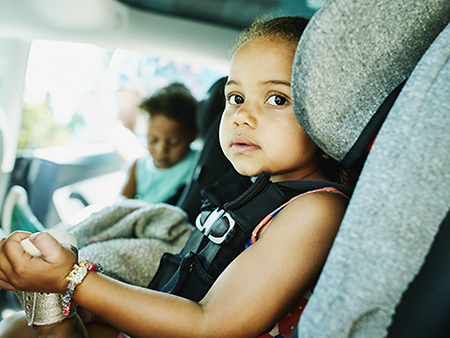
By Eric Lamar Burts
UAB News
Last year, 26 child hot car deaths occurred in the United States, with three reported from Alabama, according to kidsandcars.org. This year, seven deaths have been reported in the United States.
Candice Dye, M.D., a pediatrician at the University of Alabama at Birmingham, is sharing information and advice to parents and caretakers to prevent the accidental heatstroke deaths of children in vehicles. A vehicle can heat up very quickly even when it is not extremely hot outside, rising 20 degrees within 10 minutes.
“Parents and caretakers have a lot on their minds, and distractions are always there,” Dye said. “We have to find ways to remind ourselves and prevent harm and even death to our children during the hot summer months.
Set Reminders
Children should never be left in an unattended vehicle. Dye says it takes only a few minutes for a child to overheat, suffocate and die in a car. Compared to adults, a child’s body heats up three to five times faster. When left in a hot car, a child’s major organs begin to shut down when their temperature reaches 104 degrees Fahrenheit, according to healthychildren.org.
Often, these deaths are accidental because parents or guardians forgot their child was in the car due to stressors and distractions. Numerous circumstances can cause parents to forget children are in the car, including:
A change in daily routine can make it challenging to remember your child is in the backseat, especially for first-time parents or when it is not that parent’s normal routine to take the child to day care on that day.
Sleep deprivation, which reduces concentration and slows thinking.
Rushing to an appointment causes stress because the mind is overloading itself with multiple tasks at once.
To help parents remember their child is in the backseat, Dye recommends placing an object, such as your left shoe, purse/bag or cellphone, in the back seat with your child when you leave the house. Also, place the child’s toy in the front seat to serve as a reminder.
“We all live busy lives and can succumb to the distractions around us and in our minds,” Dye said. “As a parent, I made a conscious effort to put my purse in the backseat with my child, so I had an additional reminder when I have reached my destination.”
Dye recommends that any parent, family member or guardian transporting a child do the same, as this can happen to even the most loving caregiver and will help ensure they do not forget the child is there.
Lock The Doors
Children love to play, especially hide-and-seek because their small bodies can hide away in narrow areas. However, the same hiding spot can be boring, and they often look for new hiding places.
A child’s hiding in an unlocked car becomes dangerous as the car can get hot or the child can get stuck, unable to open the car door to get out. Both lead to life-threatening situations where a child becomes agitated and cannot breathe.
“Children love to play and don’t always realize the dangers,” Dye said. “If a child hides in a car without a parent’s knowing, there can be serious consequences.”
Dye advises parents to lock their cars and teach children that cars are not safe places to play.
Stay Hydrated
Driving with the air conditioning on is nice, almost a luxury. The hot air quickly cools down while the sweat evaporates; but what happens when the air conditioning no longer works, and a child becomes hot?
According to Dye, cracked or rolled-down windows do not prevent cars from getting too hot. She recommends parents carry bottles of water to keep children hydrated. However, do not leave water bottles in the car when you get out, because the water will heat up quickly in the sun. Only give children water you know is still cool to reduce the risk of burning their mouths.
Staying hydrated helps regulate body temperature and circulate oxygen throughout the body. Along with staying hydrated, parents should park their cars in shaded areas, bring a cooling towel or buy a cooling seat cover if they can — but none of these measures will prevent a child from dying if they are left in the car.



